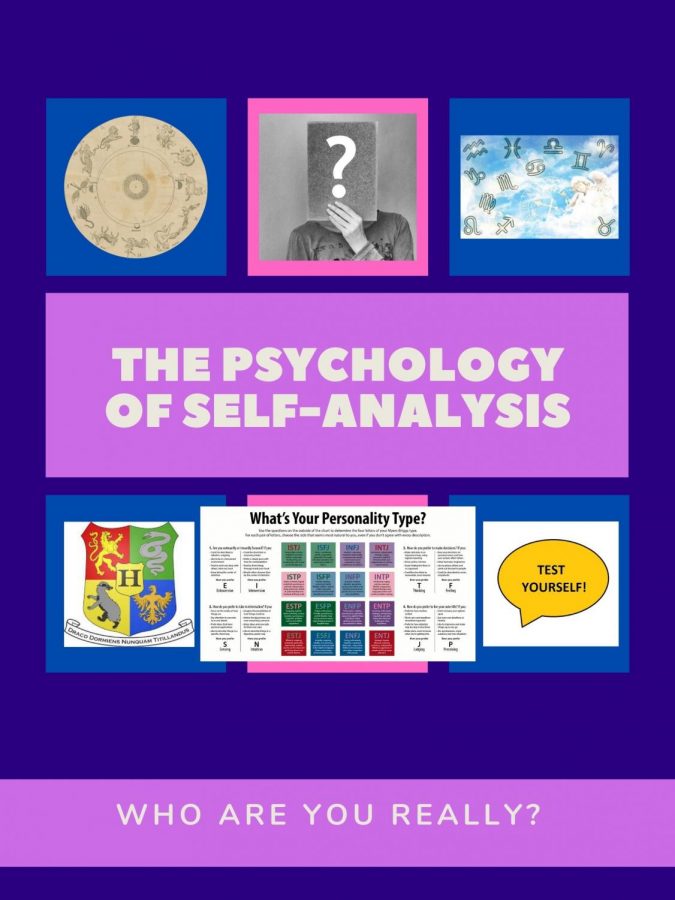The Psychology of Self-Analysis
December 16, 2020
You may have noticed in the last few months the increased prevalence and abundance of resources that categorize people, meaning the increased popularity of things like astrology, Enneagram type, MBTI type, personality tests, etc. 72.7% of C.H.S. students observed this rise in popularity and 63.6% of students said they enjoyed them. One C.H.S students said, when asked why people enjoyed these kinds of tests so much, “I think people enjoy personality tests because they can give a sense of classification and short-term gratification; however, even if they can be pleasing, they are not necessarily useful for classification because they give a response based on how someone feels or is thinking at that particular moment.” , another said “I think many people, especially teenagers, can have an unclear or warped sense of self, so the idea that something can tell you exactly what your personality is is appealing… and they’re just fun.” The purpose of this article is to speculate on the psychological reasoning for their popularity in this time, and to go into the flaws of these types of self- assessments.
We are trying to see how we are perceived by using these tests or personality categories, but we often end up trying too hard to relate to a category that we just want to conform to it. Are we actually like the categories we get, or do they influence us to become like them? Are the categories just universally relatable, so really you could relate to any result on some level? Are these tests even accurate when you are the one entering the information? Are you just perpetuating the idea of yourself you have in your head based on misconceptions? These are broad questions, but in this article I will speculate to my greatest ability.
Why is it that in this particular moment of time, these kinds of assessments have become so popular? The reason people have got so into them is that we are all at a point where there is a lack of connection, validation, and belonging. We feel disconnected and many are struggling with their perception of themselves, a common troupe of adolescence that has been amplified by Quarantine. The isolation makes us desperate for the validation and relatability of being put into a certain group. With a lack of interaction we tend to lose the sense of particular adjectives that describe us. Am I smart, laid back, driven, curious, funny, or compassionate? We form these identities based on the feedback we get from others in the ways our friends, family, teachers, or even strangers perceive us. We all have specific descriptors we have been branded with frequently, but without immersive interaction we cannot be perceived or perceive others. So, we are left with the question, who am I?
While some people turn to deep inner reflection, such as meditation, others turn to an extremely accessible medium for self discovery that has been perpetually marketed to us for the past few months, which are numerous forms of self-assessments. Astrology, for example, although having been relevant for many years, has seen a surge in adoration, especially from our generation. In astrology you have three main signs: your sun, moon, and rising. Your sun represents your overall being and if someone asked you your sign, they would most likely be referring to your sun sign. Your moon represents your emotions or who you are on the inside. Your rising sign represents your physical appearance, as well as what side of yourself you introduce first. Although these placements are determined by factors such as: birth-date, birth-time, and birth-place, each sign has characteristics associated with it that supposedly give a coherent view of self.
So for example, your sun could be Gemini, your moon could be Libra, and your rising could be Aquarius. Using the example signs referred to previously, I can give a description of the person who has these placements. The sun placement in Gemini means this person is adaptable and social, with a witty manner and an indecisive nature. The moon in Libra dictates that this person can be a diplomatic peacemaker with a desperation to please everyone around them, and who has an optimistic outlook. The rising in Aquarius means they may come off as eccentric and unique, and need a long leash in relationships.
I just described a person I have never met, based solely off of the circumstances of their birth.Now if I met a person who happened to have these exact placements would they be like this? Maybe or maybe not. In my opinion, I see no reason why Astrology should be invalidated more harshly than religion. It cannot be proven, but neither can religion. The question of the matter is not “Is it true?” But instead “Why do we, as humans, find meaning in it?” Astrology falls under a slightly different category than other kinds of personality categorization. Astrology is not self-determined; we do not input our traits and get a diagnosis of a certain personality type. Astrology is written in the stars. I think there is something appealing and romantic about the finality of your astrological assessment that people find appealing.
Now, other kinds of personality tests, such as Myers-Briggs Type Indicator (MBTI) and Enneagram type fall under a slightly different category. These assessments ask you a lot of questions about yourself, and then determine your personality type using an algorithm. There are nine different Enneagram types you could possibly get, and sixteen MBTI types. This leads to my first opposition: these two tests claim that there are a certain amount of kinds of people (in this instance one test claims nine while the other claims sixteen), implying that everyone you have ever met or will ever meet has to fall into one of these categories. This means that many people you know have “the same” personality. The human disposition is so complex that to claim two people to have the same personality seems foolish. I have never met two people who I can confidently say are the same, and according to these tests there are millions of personality clones floating around the world.
My second quarrel with these kinds of tests is that you are the one entering the information that leads to your results. It seems a bit paradoxical, if one is seeking out these tests to get a clear image of how people view them, but their results completely depend on the way they perceive themselves. So, to get an “accurate” result you would have to have a very clear image of self, and if you did, it would really eliminate the need to take the tests in the first place. Most of the time your results will just be a perpetuated manifestation of your misconceptions of your own personality.
The third, and possibly most counterfactual kinds of tests are tests like “Which character on ‘Friends’ am I?” or “If I were a Kardashian, which one would I be?” These kinds of tests are based in an abyss of a lack of substance. These can be a fun way to pass time, but they have no value in telling you what kind of person you are. The biggest problem with these tests is you can easily manipulate them to get the results you want. It’s basically impossible to answer these questions in an unbiased way. Another big problem is that these tests are just another way society conditions us to idolize celebrities and fictional characters. The way so many people base their personalities around people and trends they see portrayed in the media, is at large, responsible for the dying art of individuality.
In conclusion, personality tests fall on a spectrum of legitimacy, but none should be valued over the observations you make through inner reflection. These tests may not always be scientific, but they can be fun and stimulating, so as long as you take your results with a grain of salt there is no harm in them.






